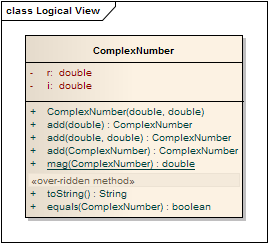
Complete the ComplexNumber class we began in the past week's lectures, according to the UML Class diagram shown below. Note that you need to implement a new static method that computes the magnitude of a ComplexNumber (recall from you math courses that the magnitude of a complex number is simply the square root of the sum of the squares of the real and imaginary components).

Solution:
package msoe.se1011.complex;
/**
* This class represents a Complex Number
* @author hornick
*
*/
public class ComplexNumber {
/** the real component of a complex number */
private double r;
/** the imaginary component of a complex number */
private double i;
/**
* Constructor
* @param r the real component of the complex number
* @param i the imaginary component
*/
public ComplexNumber(double r, double i) {
this.r = r;
this.i = i;
}
/**
* Add a real value to this complex number, and return the complex sum
* @param r the real value to add to this complex number
* @return the sum. Note: The original complex number is not modified.
*/
public ComplexNumber add( double r) {
// create a new complex number, initially equal to this ComplexNumber, that will contain the sum
ComplexNumber temp = new ComplexNumber(this.r, this.i);
temp.r += r;
return temp;
}
/**
* Add a complex conjugate to this complex number, and return the complex sum
* @param r the real value to be added
* @param i the imaginary value to be added
* @return the sum.
*/
public ComplexNumber add( double r, double i) {
// create a new complex number, initially equal to this ComplexNumber, that will contain the sum
ComplexNumber temp = new ComplexNumber(this.r,this.i);
temp.i += i; // add the arguments
temp.r += r;
return temp;
}
/**
* Adds a ComplexNumber to this ComplexNumber
* @param x reference to the ComplexNumber to add to this ComplexNumber
* @return a reference to a ComplexNumber that is the sum of the ComplexNumbers added.
* Note: To assign the original ComplexNumber to the sum, use this approach: a = a.add(x);
*/
public ComplexNumber add( ComplexNumber x ) {
ComplexNumber temp = new ComplexNumber(r,i);
temp.r += x.r;
temp.i += x.i;
return temp;
}
/**
* Computes the magnitude of a ComplexNumber
* @param x the ComplexNumber whose magnitude is to be computed
* @return the magnitude, computed as the square root of the sum of the squares of the real and imaginary components of the ComplexNumber
*/
public static double mag( ComplexNumber x ) {
return Math.sqrt( x.r * x.r + x.i * x.i );
}
@Override //this optional annotation indicates that this method is an override of a default implementation of toString()
/**
* override of the toString method
* @return a String description of this ComplexNumber, in the format "(r,i)"
*/
public String toString() {
return "[" + this.r + "," + this.i + "]";
}
/**
* Compare this ComplexNumber to another ComplexNumber for equality
* @param x the ComplexNumber to compare this ComplexNumber against
* @return true if both the real and imaginary components of the two ComplexNumbers are exactly equal
*/
public boolean equals( ComplexNumber x ) {
return( this.r == x.r && this.i == x.i );
}
}